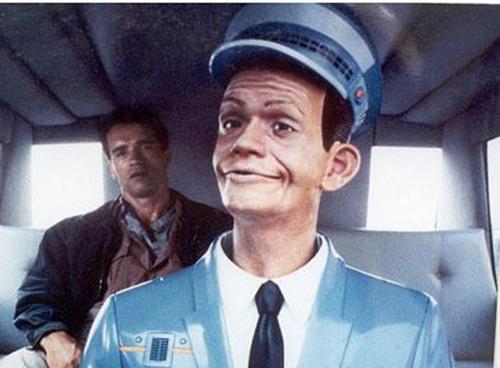Google Pushing Driverless Car Tech
'We should be the catalyst' says Google founder
There's little doubt that 'driverless' car technology is inching ever closer to becoming some form of reality.
But while Ford is busy imagining auto-piloting you into an EV-only lane on your morning commute via the Evos concept, and BMW is actually testing out 'autonomous' 5-series cars an actual, real-live motorways, nobody's putting a date on when cars will start to drive us rather than the other way around.
If Google has anything to do with it, however, that sci-fi future could soon become a genuine reality.
The internet giant has been pushing the concept of the driverless car hard for a while now, and reckons it could save up to a million lives a year by doing so. It also feels that it has to be the organisation to push the concept of the driverless car into reality.
Speaking at the recent Google Zeitgeist, company founder and CEO, Larry Page, explained how he feels it is Google's job is to push tricky technologies to market.
"We asked people who were working in that area why don't we have an automated car? Why can't I buy one?" He said. "They said 'We can't actually figure out how to do it. There are regulatory issues and all these other kinds of things'.
"So I think part of our role as a catalyst is to make sure that some of these things actually start up and happen and make sure we push through the difficult issues to make it real."
"They [driverless cars] will work substantially better than an average person and get better from there, and continue improving. You'll get a software update and your car will be safer which is great."
All very noble, Mr Page, but who's going to sell the software, we wonder...? Page is also keen to help remove the waste that is the daily commute. "They could be doing useful things in that time," (hich is true), "or watching TV," (which is hardly productive) "or looking at ads," (ah, now we come to the nub of it...).
Save a million lives a year. And sell a heap of ad space at the same time. Ain't capitalism wonderful?
Would also help prevent all "human induced" problems such rubbernecking, being half asleep / preoccupied at the lights, etc..
I also can see it has the potential to improve congestion in major cities, but surely the next step in cities is more effective traffic monitoring to adjust the flow of traffic (through traffic lights etc)rather than handing over complete control of the car.
Well, potentially, opens a whole legal and legislative can of worms, imagine the insurance claims or your car being awared six points, people getting off because they claim the car was driving at that time, would have to have rigourous logging/telemetery.
Well, potentially, opens a whole legal and legislative can of worms, imagine the insurance claims or your car being awared six points, people getting off because they claim the car was driving at that time, would have to have rigourous logging/telemetery.
Driverless cars are in my opinion more closely related to public transport than they are to a traditional car when it comes to responsibility. If the "driver" of such a car is encouraged to do something else other than drive, then he is merely a passenger and cannot be axpected to be responsible for salvaging a situation which might require split second reactions (emergency brake for instance). This renders the the "driver" (or "user" which seems like a more appropriate title) a mere passenger, and therefore not directly responsible for the vehicle's actions.
So where does this leave us? I'm sure many entities will discuss this in the coming years, but one option is to own your "car", where you input destination and thats it. If its operation is then governed by integrated software interfacing with the transport network (think automated landing systems in planes) the responsibility for what happens between you inputting the destination and you arriving could well lie with the network operator (think network rail). So you buy the "car", and then pay a fee of X for it to be used on the network.
Theres no denying that the magitude of change here and its integration is simply mind boggling. Whatever happens, the end result is something that anyone who enjoys driving and the sense of freedom and fun it brings would consider nightmareish. So much for picking up your keys in a flight of fancy and letting the road decide where you end up.
Problem with this sort of thing is, when it becomes widespread, controlling governments will see that, as all motoring amounts to is moving from A to B, there's actually no point in controlling your own car at all.
Then they'll effectively ban driving, and entrusting driving to a human will be considered shockingly, unforgiveably dangerous.
And we'll just continue to drift towards a Wall-E world where we drift through life interacting with everything virtually, cocooned from reality at all times, sponsored by Google, Apple, Microsoft and Amazon.
And I'm afraid I don't see any point in living in such a sterile, awful world. Predict festering, overflowing pits of suicide cases if the march of the computers continues.
Well, potentially, opens a whole legal and legislative can of worms, imagine the insurance claims or your car being awared six points, people getting off because they claim the car was driving at that time, would have to have rigourous logging/telemetery.
All very hypothetical though until the technology actually appears.
Well, potentially, opens a whole legal and legislative can of worms, imagine the insurance claims or your car being awared six points, people getting off because they claim the car was driving at that time, would have to have rigourous logging/telemetery.
All very hypothetical though until the technology actually appears.
Gassing Station | General Gassing | Top of Page | What's New | My Stuff








